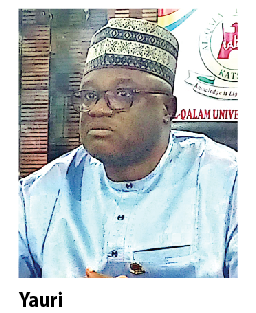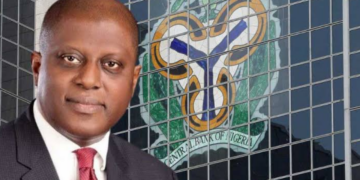Tell us the success story of Al-qalam University.
Al-qalam University Katsina was established in 2005 as the first private university in this part of the country. I can say conveniently that in the seven Northwest states, Al-qalam University was probably the first private university. But what is very special about this university I need to point out as I have always told the regulators, particularly the National Universities Commission (NUC), is that we are probably the only community non-profit university in Nigeria.
Why I have always said this is to attract the attention of Nigerians to this special feature of our university so that probably, more individuals, organisations and community leaders will come forward to assist the university. It is a ‘community university’ not owned by any proprietor and so, no one collects profits at the end of our operating year from the activities of the university.
We are a community university founded by a community non-governmental organization and we have kept to the true spirit of a non-profit university.
I can also unequivocally say that this university charges the least tuition amongst all private universities in Nigeria. Our tuition for quite several programmes is still around N135,000 and for some other programmes just about N270,000 per session. And that is because we are a community, nonprofit varsity. We want to allow children from different backgrounds to come here and have the opportunity to learn and qualify for the award of degrees.
This university belongs to all of us and we welcome children from every part of the country. Whoever is qualified will get admission here and he or she regardless of where the student comes from will pay the same tuition which is affordable enough.
The university since its inception has grown over time. We started with just about three programmes but now we run about 31 degree programmes. But what is even more interesting is that we have accreditation for all the programmes we run at the university.
We’re able to have accreditation for those programmes because we have continued to pursue a modest growth strategy and we are not in a hurry. Sometimes a private university will be established and after two or three years, you will see it running 40 programmes.
That is not the same strategy we are using. We have introduced programmes according to our capacity and aligned with the demand of regulations. Whenever we understand that we have major regulations to establish a programme, we establish them and try to consolidate them before we move into another one.
Although we are a pioneer private university in northern Nigeria, you’ll find that we have fewer programmes than some younger tertiary institutions. We move as occasion demands per time. It’s interesting to note that recently, we entered into an agreement with the Katsina State government to give us the opportunity to use their hospitals; Ahmadi Rimi General Hospital, Turai Hospital and other hospitals to start training students in allied health sciences like Nursing, Radiography, Medical Laboratory Science and what have you. That is also aligned with our growth strategy.
We’re now trying to see how many programmes we can start with and like I’ve emphasised, unlike our sister institutions who may start ‘doing trial error,’ our plan in the next 1-3 years is to choose maybe Nursing, Medical Lab Science or Physiotherapy and then we float.
Then after some time, we consolidate them and then bring another two and over some time, we’ll be able to offer those programmes with the quality that they deserve. Over the years, the university has received quite a lot of support from communities and other donors. Our largest donor, Alh Aminu Dantata gave the initial donation of N1 billion to build infrastructure here and we have continued to receive grants from other stakeholders.
The most recent opportunity was given to us by the chairman of the BUA Group, Alh Abdusamad Rabiu, who in December 2022 announced the infrastructure development grant of N250 million to our university. We are in the process of accessing and utilising that grant.
We are hoping that the grant will be used to build the college building for the proposed college of Allied Health Sciences. We have made a lot of achievements.
We are grateful to God. Our students are excelling. Some of them have travelled to the UK, the US, Ukraine, to Malaysia, and are performing excellently. Some of them are among the best students in their programmes at the master’s and PhD levels.
Recently, we have increased the size of the academic staff in the university. We have recruited very young people, about 62 of them who have joined the university. Some of them have done their masters while others have started their PhD programmes and I’m optimistic that they’ll make very meaningful contributions to the development of our university.
What is the current strength of students? What areas is the institution carrying out research to assist in the nation’s development?
We have quite several programmes and we have about 5,000+ students. In terms of staff, we’re also doing well. We have done some streamlining and our teachers-students ratio is very good. We have about 200-250 staff.
When you take into consideration the recruitment, we deliberately tried to balance the staff-students ratio issue so that it will be within the comfortable range that the regulatory agencies are looking for from us. But in addition, we have some of the finest professors and senior academics from sister universities who are here either on sabbatical or visiting, and they’re helping the university.
So, concerning the balance between staff and students, what we have done in the last few years is very remarkable and that is why the university is now very comfortable and is in tune with what the NUC expects from us.
We have a new School of Post-Graduate Studies. It is comparatively new, especially if you look at it in the light of sister universities operating postgraduate programmes for 30, 40 years. Ours is new, maybe, not older than six, seven years. And we may have less than a thousand students that enrolled in the different post graduate programmes, but we’re also looking ahead as we grow because you know, I told you we are being very cautious as an institution.
I’m sure you are aware of the crisis and politics going on in the TETfund about the award of grants to private universities, which has not been sorted out. It’s a policy of the federal government, but I think we belong to the committee of vice chancellors of private universities and I know we are making effort at that level to see how we can push so that no matter what, since we’re also making our modest contribution to education in Nigeria, maybe as time goes on, we would be able to push for TETfund to give us grants.
Concerning research, I think our strengths come from individual research that our lecturers are making. We have some fine young men and women who have been published in Q1 journals around the world. And even recently, one of them shared one article that has been published in the Q1 journal.
Let me tell you about two areas we are now emphasising concerning research: We have a new director for Research Innovation and Development and recently Vice President Yemi Osinbajo, in a zoom meeting with 12 professors, and I was one of them, said, “look, gentlemen, how come we have a society where the non-formal sector participants go to the hospital, they suffer, they die from small diseases?” He put two fundamental questions concerning health insurance. And said, look, only people who are in formal employment benefit more.
So, I came back and I said, look, we had a conversation with the vice president. I think our university has somewhere we can keep it. And then he also commented on online and distance learning. He said “we have a country that is growing in science. Are you telling me that we are going to continue pushing a model where you have to come within the walls of university to learn and take a degree, whereas the world is already moving and making progress?”
I can promise you that for the insurance for the non-formal actors, our research and innovation director mobilised a few students and they develop an app on how you can use the telephone as a small and petty trader to push some money into an account, which may not necessarily be an account, but that app will give you an identification number to give health insurance providers. And through that, you can go to the hospital, give that ID, and the hospital can just treat you and then claim. And using the application you’ll be pushing just N10, N50 or N200 as the case maybe. You just use the ID to transfer. It’ll be from your balance on your credit with the telecommunication company. You can keep some money there.
I’m telling you this because the students took it to a national competition. And I’ve already spoken with the office of the vice president to tell him if he will have the time to fix an appointment with him.
Recently, we got identified by NITDA also for smart agriculture. You know, we have an institute for semi-agriculture studies and through that, we were identified by NITDA to have a combination of agriculture and IT, so that one is also ongoing.
Our university is one of the focal universities. They came and did the training for some students and we are trying to see how we can apply that.
Concerning the identity of Al-qalam as an Islamic university, you can see it in our vision, and mission statement. That is why I’m sure you have not received any complaints since our inception. We don’t push anybody for worship, but we insist on decency and character. I think all religions seem to have the same understanding and a common position concerning decency, respect and what have you. That’s what we try to inculcate in our students, the moral values so that when they leave our university and go somewhere, they will be proud of Al-qalam.
Anybody can belong to his religion; nobody here talks about it. And I’m pretty sure in the last 17 to 18 years we have existed, you have not heard anybody complaining. I know the reports I got from tertiary institutions who insist on worship that if you come to our university, you must pray like this or you must pray here, no. If you are Muslim, you go to your mosque. If you are a Christian, you go to a church. Nobody asks questions. Nobody even wants to know. But concerning the issue of decency and morality, we don’t want students coming in here and spending four years living with a character that is not beneficial for university graduates.
May we know the constraints you are facing as a non-profit university
Yes, we have financial constraints and that is why I said the Kano State government brought their students here on scholarship and we admitted them as I mentioned as a community nonprofit school. We allowed them up to 400 level and when it was time for youth service, we still asked to go, but they have not paid us. We’re believing that the state government will pay us our money.
We gave them their statement of result; they went for NYSC whereas our sister universities where the same government sent students, refused to allow them to go for service. Some of you are aware you may have some brothers or sisters who benefited. Up till now, the Kano State government has paid us N38,183,161.
The initial figure was N52.8 million but they later said, “okay, VC, we are not sponsoring spillover.” They said once it is four years and the person adds one year, they won’t pay. It’s about N14.7 million. We said, okay, take this 14.7 million. What of the period they spent under your scholarship year? I’m telling you that the N38 million can help you build even if it’s four classrooms here; it’ll help the children of the needy.
But unfortunately, that is how our university is being treated. Some of these universities stood their ground, they were paid, and they were richer than Al-qalam University.
And so we are appealing to all people of conscience to convince the Kano State government to consider that this university is charity-based. It’s a community university. Please, let them please fulfil their obligations to us so that we can reduce some of the problems we’re experiencing here.
You said Al-qalam charges the least tuition among private universities, but some people consider it a school for the rich. What is your take on this?
It is true; people think so. Once we check the records, people see Al-qalam as the university for the children of the average and the rich, but it is not correct. Come here and check. Look at the children who registered here, are they from rich backgrounds?
Some of them cannot even pay the school fees in time. So, we stagger it into three. When you come, you pay at the end of the first semester, you pay at the end of the second semester. If they are children of the rich, they will be paying four million Naira, not N135,000.
You know Nigerians. Sometimes they don’t collect facts but just talk. If you bring your child here to take English or Education Economics, be rest assured, even this year you would register at about N140,000. Even some secondary schools are charging more than that. I’m talking about a whole session. What we do, let me assure you, we insist on financial controls to make a difference between revenue and expenditure. We’re able to pay lecturers and non-academics. And this year, very interestingly, we bought cars for the deans and buses for the school.
So, if you see them saying it’s a school for the rich, they’re rich but the fact of the matter is that we’re trying to keep the expenditure within reasonable limits. I tell you, whether it is hidden or open, nobody collects return profit from the university at all.
We keep our quality and we’re improving on it to develop our models. Even at the senate, we had recently told them our focus this year is on students’ welfare, academic quality and ensuring that lecturers go to class to cover the syllabus.
The foundation is an NGO and it’s doing charity work and as long as we’re concerned, we are not interested in the profit or the returns. We just want to create an environment where people can come and earn a degree. We accept endowments, collect donations and do financial control. That’s how we can pay salaries without hitches.
How do you want to see the university in the next five years?
My vision for the university is to grow a school that will be respected among its contemporaries and give degrees to students so that people will testify that they passed through a good university and they have quality in areas they have been trained. Internally, we are doing what is right, whether in academics or non-academic fields. I want to see a university in five years whose name will be heard.
That is why we’re emphasising Entrepreneurship, Research, Innovation and Development. There is another child who has done the robot. I’m sure I can even share the video with you. The boy said, “Sir, you see this robot? I can fly it for hours. It can go around farms. It can give you data, study and you can use it for agriculture.” He said, “this robot can be used for defence. Can you get the government or anybody to entrust this robot to help in enhancing security? If you want me to align it with security I will. We can attach a camera that will run for a few hours and instead of the police patrolling, we can deploy it and it will be sending signals on what is happening along the roads.”
We have brilliant students, believe me, there are about 20 to 25 per cent of students here who have gone to some of the best private primary and secondary schools. Very brilliant children and yet even those from average families, I have seen very brilliant children here if we give them an environment. But unfortunately, I don’t want to go into political economy. We have a society.
I know universities that can make contributions, but sincerely speaking, nobody is listening to them. Otherwise, some of the results of research and innovations coming from universities could be utilised.





